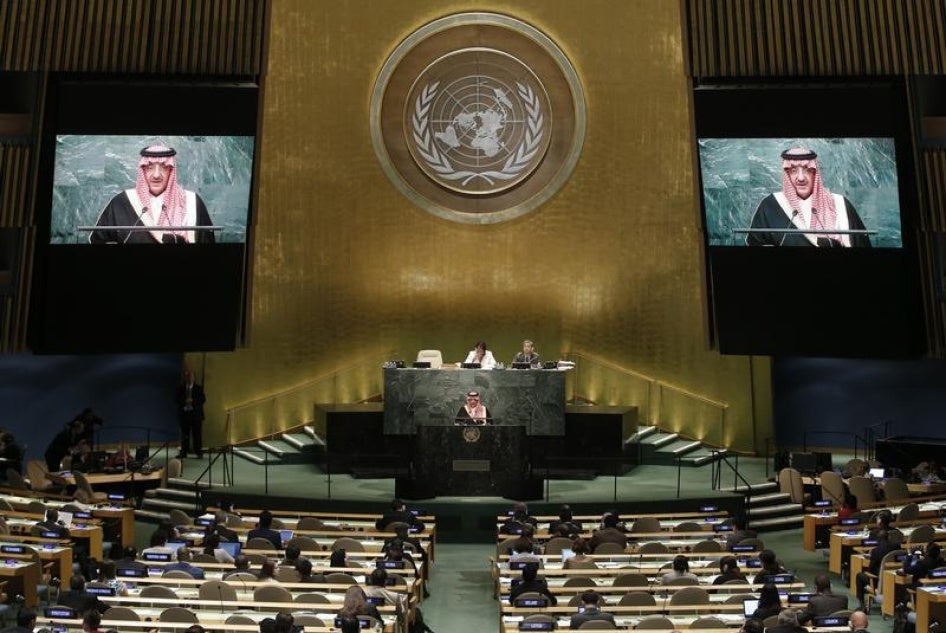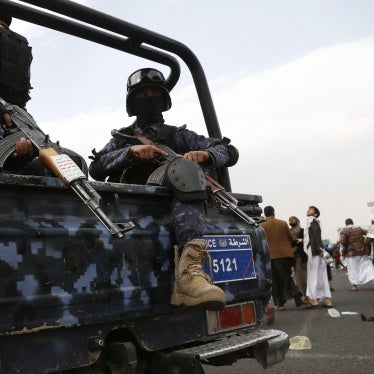(Beirut) – A United Nations official who recently visited Saudi Arabia has criticized the country’s use of its terrorism tribunal and counterterrorism law to unjustly prosecute human rights defenders, writers, and peaceful critics, Human Rights Watch said today. Ben Emmerson, the UN special rapporteur on human rights and counter-terrorism, issued his statement on May 4, 2017, following a visit to the country from April 30 to May 4.
“King Salman should immediately pardon and release anyone imprisoned merely for peacefully expressing their opinions,” said Sarah Leah Whitson, Middle East director at Human Rights Watch. “In combating terrorism within its borders, Saudi Arabia should engage with rights activists and offer them a seat at the table rather than a bed in a prison cell.”
Saudi Arabia’s counterterrorism law and a series of related decrees are used to criminalize a wide range of acts as “terrorism” including intending to “insult the reputation of the state,” “harm public order,” or “calling for atheist thought.”
Emmerson said that Saudi authorities denied him access to people jailed under the counterterrorism law and expressed concern regarding Saudi Arabia’s “unacceptably broad definition of terrorism.” He also called on Saudi Arabia to set up “a new independent mechanism to re-examine all cases where people had been jailed for exercising their rights of free speech, thought, conscience, religion or opinion, and of peaceful assembly or association.”
In his statement, Emmerson urged Saudi officials to limit the legal definition of terrorism to “acts or threats of violence that are committed for religious, political or ideological motives, and that are aimed at putting the public or section of the public in fear or to coerce a government or international organization to take or refrain from taking any action.”
Since 2014, Saudi authorities have tried nearly all peaceful dissidents facing broad, catch-all charges in the Specialized Criminal Court, which the authorities set up in 2008 to investigate terrorism-related crimes.
Human Rights Watch research has found that the court often convicts suspects on charges that are not recognizable crimes. Some speech-related charges have resulted in prison sentences of between 10 and 15 years.
Saudi activists and dissidents currently serving long prison terms based solely on their peaceful activism include Waleed Abu al-Khair, Mohammed al-Qahtani, Abdullah al-Hamid, Fadhil al-Manasif, Sulaiman al-Rashoodi, Abdulkareem al-Khodr, Fowzan al-Harbi, Saleh al-Ashwan, Abdulrahman al-Hamid, Zuhair Kutbi, and Alaa Brinji.
In other cases Human Rights Watch analyzed, the court convicted defendants solely on confessions that the defendants later retracted in court, saying that they only confessed under torture and duress. Some of these cases resulted in the death penalty.
On January 2, 2016, Saudi Arabia carried out a mass execution of 47 men for “terrorism offenses.” Forty-three were associated with Al-Qaeda attacks in the 2000s, and four were Shia allegedly involved in protest-related crimes in 2011 and 2012. It was Saudi Arabia’s largest mass execution since 1980. Among those executed was Sheikh Nimr al-Nimr, a prominent Shia cleric sentenced to death in 2014 after the Specialized Criminal Court convicted him on a host of vague charges, apparently based largely on his peaceful criticism of Saudi officials.









